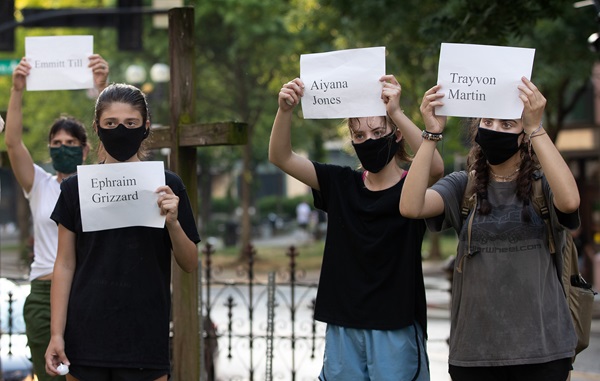The Golden Rule might be a good starting place in white people’s conversations about anti-racism.
Numerous verses through the Bible (Leviticus 19:34, Matthew 7:12, Luke 6:31) teach the principle of treating others the way we want to be treated, a fitting lens through which to examine the centuries of injustices against people of color.
“I don’t think (the Golden Rule) happens in society right now,” says John Baker, a retired Indiana state judge and member of St. Luke’s United Methodist Church. “So I have to make some changes.”
Baker is one of four United Methodists, all white, who are among the denomination’s members speaking out boldly and unapologetically about what it looks like to work toward racial justice, understanding privilege, and condemning systemic racism.
An issue of justice
“I spent my life, I thought, working on issues of justice,” says Baker. “I had to confront the fact that right here in my own church, our community, state and nation, we don’t have justice for a significant number of people. I’m going to spend the rest of my days, I hope, in trying to rectify that.”
Liz Shadbolt, a United Methodist deaconess who is a member at Glendale United Methodist Church, works with marginalized communities, primarily with people experiencing homelessness and former refugees. The question of whether to step into the racial justice conversation is a simple one for her to answer.
“If you’re refusing to take sides, you’re taking the side of the oppressor,” Shadbolt says. “That’s not the side I want to be on or the side I think Jesus would be on.”
Growing up in a rural Indiana town that was primarily white, Travis Bannon only came to understand racism as a student at Indiana Wesleyan University, where he received an undergraduate degree in 2015 and a master’s degree in 2017. While at IWU, Bannon volunteered with a youth basketball program, whose members were Black. He now is a member at St. Luke’s United Methodist Church, where he also works as associate director of student ministries.
“Because I have white skin and kind of dress nicely, the world is built for me,” Bannon says, “I’m never uncomfortable if I don’t want to be, I don’t have to fear because of that and I don’t have to change if I don’t want to. That realization started me on a journey to understand more.”
Systemic issues
Education is step one, but also a step that never ends.
“I have to start to understand Christ’s love and care for the marginalized. And in the society, race is a huge part of who falls into that category and it did in Jesus’ time, as well,” Bannon explains. “Jesus called us to break those barriers and care for those who are oppressed and marginalized.
Call to action
- Educate yourself. Here is a list of books to get you started.
- Engage in spaces where you are a minority.
- Form groups where white people are learning and supporting one another.
- Speak up and speak out.
To learn more ways to take a stand against racism, click here.
“Most people would say that explicit prejudice and racism is wrong. (But) most people won’t do the work to see how it invades the systems…There are good and well-meaning white people who do more damage because they don’t understand,” Bannon says, citing the “color blind movement” as an example.
“It’s born out of a well-meaning desire to treat everyone equally,” he admits, “But it’s hurtful if you don’t recognize that someone’s race plays a part in their everyday experience.”
“If we’re trying to say we’re blind to (race), we’re ignoring a lot of people’s struggles,” Shadbolt adds. “We’re not paying a lot of attention to their pain.”
Hearing from Black church members how his own church engaged in racist activities awakened Baker’s consciousness to his role in racism.
“I heard things that I didn’t want to know and that’s how I got started on my journey,” Baker shares. He has resolved to quit being passive on the subject and is actively learning and conversing with others, both within the white community and with people of color.
Confronting racism
“You can’t wish it away,” he states. “You have to confront it.”
Confronting racism means stepping into spaces where, if you are white, you are a minority.
Being in relationships with people who don’t look like you is important. Bannon, Shadboldt and the Rev. David Tatgenhorst choose to live in diverse communities. Tatgenhorst, who pastors St. Luke United Methodist Church in suburban Bryn Mawr, Pennsylvania, lives in an urban Philadelphia neighborhood.
“If we’re going to heal (racism), we have to be able to look at it, to see it, to know what it is,” says Tatgenhorst, who has been involved in community organizing efforts around housing, jobs and healthcare. As a pastor, he works throughout Pennsylvania to bring people together for conversations and work regarding basic human needs.
“If I’m in denial, then I’m not seeing the true reality of the world. I’m not seeing people as they are,” Tatgenhorst states. “Doing this work opens my eyes, my perspective to be able to see reality and to see other people as they are and to know myself. It’s liberating.”
It’s important to recognize that fear also can be part of the equation, Tatgenhorst says.
“When we call Jesus, ‘Savior,’ what we get saved from is our denial, our blindness and our fear.”
Nobody claims this work is easy.
“It takes a lot of vulnerability,” Shadbolt says. “This isn’t about being right or wrong but being willing to learn and being willing to do better.
“Instead of calling people out, how do we invite people in?”
Crystal Caviness works for UMC.org at United Methodist Communications. Contact her by email or at 615-742-5138. This story was published on February 5, 2021.





